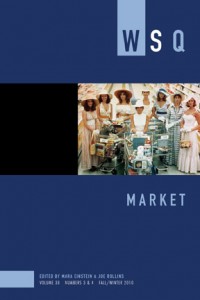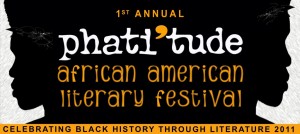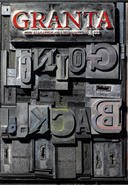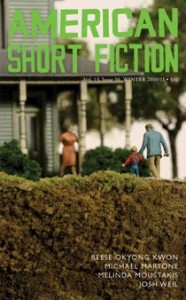This issue opens with a moving tribute to and a series of poems by widely published poet and former Fiddlehead editor Bill Bauer (1932-2010). Bauer was a Maine native and long-time resident of Fredericton, New Brunswick, Canada, where the journal is published. It’s hard not to tear up on reading his first title here, “If I Don’t Tell You, No One Else Will; or, How Lucky You Are To Have Your Whole Lives Before You.” Lucky, too, to have a journal as pleasurable—and as enduring, the journal is in its sixty-fifth year—as Fiddlehead. Bauer is joined by 25 accomplished poets and fiction writers and a half-dozen smart book reviewers. This issue’s cover, too, deserves mention, a beautiful muted watercolor of seashells in a silver bowl by Fredericton native Andrew Henderson. Continue reading “The Fiddlehead – Autumn 2010”
NewPages Blog
At the NewPages Blog readers and writers can catch up with their favorite literary and alternative magazines, independent and university presses, creative writing programs, and writing and literary events. Find new books, new issue announcements, contest winners, and so much more!
The Fiddlehead – Autumn 2010
Spread the word!
Irish Pages – 2010
“Some time ago, we decided to devote most of one issue to Irish Pages/Duilli Eireann to contemporary writing in Irish, so as to illustrate the still-thriving literary life of the island’s old language. We appreciate that much of the this issue will be inaccessible to many of our readers, but hope that those without Gaelic will nonetheless glean some sense of the rich Irish-language dimension of contemporary Irish literature,” write the editors. And we do! Continue reading “Irish Pages – 2010”
Spread the word!
Memoir – 2010
Along with the expected personal and family stories in prose, “memoir” in this issue includes the journal’s Best Graphic Memoir pick, “The Rejection Collection: A Visual Poem,” by Corey Ginsberg, a clever composition created of a series of photos of phrases from rejection letters received and the author’s musings about these hurtful strips of paper and their disappointing news: “How was it that my standard, hour-long wait in line at the Miami Post Office, enclosed $20 reading fee and eight months spent floating in ‘status of my submission’ Limbo didn’t even afford me an entire sheet of paper when I was rejected?” In the end Ginsberg’s rejection collage project seems to have been more encouraging than discouraging, as expressed both in the piece and in the lengthy “About” notes (a convention the journal uses for pieces with visual content). In any case, it turned into an acceptance! Continue reading “Memoir – 2010”
Spread the word!
Poetry Kanto – 2010
Published by the Kanto Poetry Center at Kanto Gakuin University, Poetry Kanto publishes English translations of Japanese poems (along with the originals) and “exciting English language poetry from anywhere on the globe.” The journal is handsomely produced and clearly an effort of editors passionate about poets and poetry. The work of ten poets is presented here, each series of poems preceded by a long bio and photo of the poet. Continue reading “Poetry Kanto – 2010”
Spread the word!
Redactions – 2010
“For every poetic action there is…Redactions,” is the journal’s tagline. This issue’s “poetic actions” include poems by two-and-a-half-dozen poets, including such well-known names as David Wagoner, J.P. Dancing Bear, and Gerry LaFemina, and the less-widely established, but quite widely published Jeanine Hall Gailey and Walter Bargen; as well as “poetics,” substantial reviews of poetry books and blogs. Continue reading “Redactions – 2010”
Spread the word!
Reverie – 2010
A special tribute issue of this journal of Midwestern African American Literature is devoted to Allison Joseph, Aquarius Press Legacy Award Recipient, five of whose poems appear here. The cover is an evocative portrait, “Mattress Man,” by accomplished photographer and fast-becoming ubiquitous poet Thomas Sayers Ellis, whose poem, “Absolute Otherwhere,” appears in the issue. Sayers Ellis has an eye for desolate views and an ear for inventive diction: “We know there’s a recognizable We, / an I-identifiable many.” Continue reading “Reverie – 2010”
Spread the word!
Salamander – Winter 2010/2011
This strong issue includes the winner (Timothy Mullaney for “Green Glass Doors”) and runner-up (Susan Magee for “The Mother”) of Salamander’s first-ever fiction contest, three other stories, a memoir essay, and the work of more than two-dozen poets. Continue reading “Salamander – Winter 2010/2011”
Spread the word!
Saw Palm – Spring 2010
Florida is a wildly unique collage of environments, from the gritty urban core of Miami to dense crocodile infested swamps; from the upscale shops of tropical Longboat Key to the historic architecture of Jacksonville, where the nights are distinctly northern with their chilly edges. This journal reflects this rich diversity from the edgy, tongue-in-cheek poetry of “spotlighted” poet Denise Duhamel, to the arch intelligence of prose stylist Janet Burroway (an interview and a story)—I have always admired them both. Continue reading “Saw Palm – Spring 2010”
Spread the word!
While the Women Are Sleeping
While the Women Are Sleeping by Javier Marías is a collection of ten beautifully written short stories that raise questions about love, death, the afterlife, and the capability of people to be truly original. The collection opens with the title story “While the Women Are Sleeping” and highlights the interaction between two men—strangers and fellow beach goers—outside a hotel pool in the middle of the night: “Viana buried his face in his hands, as I’d seen him do from above, from the balcony, but not from down here, by the pool. And I saw then that this gesture had nothing to do with suppressed laughter, but with a kind of panic that nevertheless failed to negate a certain serenity.” However, tension mounts as their friendly conversation morphs into one man’s obsession with his girlfriend, and Marías creates intensity and suspense with amazing skill. Continue reading “While the Women Are Sleeping”
Spread the word!
Bone Fires
Bone Fires by Mark Jarman is a collection of new and selected poems. The book begins with the 19 new poems, which carry on themes found in earlier collections of Jarman’s work—a keen interest in nature and the surrounding world, a love of family, and a struggle with the mystery of spirituality. Many of the poems recount incidents from his childhood. One such poem, “Mary Smart,” reflects on the life of a widow he knew when he was young, who told him “Mark, you know we are not our bodies,” referring to the spiritual aspect of a person that the author questions and examines throughout the book. Continue reading “Bone Fires”
Spread the word!
Mapmaking
Mapmaking is last year’s winner of the John Ciardi Prize for Poetry, awarded annually by the University of Missouri-Kansas City’s BkMk Press. Harland’s book was selected by Sidney Wade, who praises the book as “imaginative writing at its best.” These are quiet poems, by which I mean they are never ostentatious or particularly bold or inventive. And they do not pretend to be. They rely instead, and successfully, on powerfully insightful and compact instances of poetic precision and emotional and philosophical acuity. “Picture a New York gone infinite, // a little pearly,” Harland writes; understand a morning as having “a bird’s worth of restlessness”; and a fossil is a perfume; and walking on Clare Island, the poet traverses “a place that lived beyond its future.” Continue reading “Mapmaking”
Spread the word!
No Space for Further Burials
You don’t have to know the political history of the many conflicts in Afghanistan to understand Feryal Ali Gauhar’s novel, No Space for Further Burials. In fact, the meaninglessness of politics in such a place is one of the key themes Gauhar explores. In an environment where survival is day-to-day—even minute-to-minute—and cruelty and suffering come from a myriad of conflicting sources, politics is the last thing on anyone’s mind. Continue reading “No Space for Further Burials”
Spread the word!
Recipes from the Red Planet
Odd. There is just no other word to describe Meredith Quartermain’s collection of sixty short pieces. From the title, and even from the comments on the back of the book, I expected Martians and food. And while the collection contains both, neither one is the driving force. In fact, even having finished this volume, I am still asking that question: what propels these pieces? What is the organizing principle here? Continue reading “Recipes from the Red Planet”
Spread the word!
El Golpe Chileño
Is the title page a subversive example of “golpe chileño” or a mistake: Peter Lorre Goes Buggy. A Biography. by Cem Çoker and issued by Gneiss Press (“on the dusty road to hits”)? According to Ugly Duckling Presse (from book publicity on the website) and a brief introduction in the book itself, golpe chileño is a form of street crime in Barcelona. (Spain’s major cities were, at one time, notorious for the many types of thievery perpetrated on tourists in the streets). So, perhaps this, too, is a trick—look over here (maybe you’ll think the book is in Spanish by the cover); no, look over here (this is a book about that odd classic movie actor, Peter Lorre). Gottcha! Continue reading “El Golpe Chileño”
Spread the word!
Touch Wood
“ ropositions written broken-english wise,” the poet writes in “Average Reader,” a phrase that embodies this book’s essence and which characterizes what is most appealing about it, original syntax, a unique sense of what can be “english-wise.” Perhaps the poet imagines that this unique language is precisely what we need to survive: “you want to be saved,” Mobilio insists in the collection’s opening poem, “Touch Wood.” And how could we not be saved by such lines as “we lay down housed,” reminding us of the human capacity for invention, for creativity. Continue reading “Touch Wood”
ropositions written broken-english wise,” the poet writes in “Average Reader,” a phrase that embodies this book’s essence and which characterizes what is most appealing about it, original syntax, a unique sense of what can be “english-wise.” Perhaps the poet imagines that this unique language is precisely what we need to survive: “you want to be saved,” Mobilio insists in the collection’s opening poem, “Touch Wood.” And how could we not be saved by such lines as “we lay down housed,” reminding us of the human capacity for invention, for creativity. Continue reading “Touch Wood”
Spread the word!
Invisible Strings
Invisible Strings, Jim Moore’s sixth collection of poetry, is a collection of sparse, brief poems, focusing on single moments in everyday life. These snapshots are of ordinary events—his mother setting the table, a boy crossing the street with his father, a single car on a dirt road. Continue reading “Invisible Strings”
Spread the word!
Heterotopia
In Heterotopia, Lesley Wheeler considers the interactions of time and space—in particular, the space of Liverpool, England, and the time of her ancestor's lives, particularly her mother's, in that place. Continue reading “Heterotopia”
Spread the word!
Unbeknownst
“I love this book,” is this book’s opening line from a poem titled “Use the Book,” and while the poet is not ostensibly referring to her own book, the combination of the self-referential title and this first line are impossible to separate from the book we have in our hands. This is not to say that the poet means she loves her own writing, but that she loves the act of writing, of creating poetry, of offering us her book. One way or another, we’re meant to make the association between the book she loves and the book we’re holding in our hands. “Take this,” the poem ends. How can we think otherwise? Continue reading “Unbeknownst”
Spread the word!
Earth Listening
These are lovely poems from a poet who has lived for a long time in Greece (she also maintains a home in New Hampshire) and writes with grace and elegance about the natural world in its relationship to human stories and histories. Her verse is more restrained than effusive, more controlled than lush, rendering the landscapes of her geographies, her (our) history, and her mind in sharply etched lines: Continue reading “Earth Listening”
Spread the word!
Lord of Misrule
National Book Award winner Lord of Misrule by Jaimy Gordon, inspired by a summer job she had during her college years, reveals the world of the rundown horse stable/racing operation full of sore, over-run horses, cynical, sometimes drug-taking groomsmen and criminal owners. Indian Mound Downs in West Virginia has a number of such characters, with the most sympathetic of the humans being seventy-three-year-old black groomsman Medicine Ed, hobbling on his “froze-up left leg, the result of being run over by a big mare” and a newcomer with “frizzly” pigtailed hair, Maggie. But it is appropriate that the chapters have the names of horses, since the animals get most of our sympathy. The story involves the back-and-forth ownership of horses, culminating in the destruction of some favorites, caused perhaps by the meddling of “Medicine” Ed mixing up his unknowable potions. Continue reading “Lord of Misrule”
Spread the word!
Bookstores vs. Digital
USA Today‘s Thursday cover story: Is there hope for small bookstores in a digital age?
Spread the word!
Women’s Works in Review
In The New Republic article A Literary Glass Ceiling?, Ruth Franklin takes on the issue of female writers and the reviews (or seeming lack thereof) of their work.
Spread the word!
WSQ New Editors
 Women’s Studies Quarterly welcomes two new editors: Amy Herzog, associate professor of media studies and coordinator of the Film Studies Program at Queens College, and Joe Rollins, associate professor of political science at Queens College and the CUNY Graduate Center.
Women’s Studies Quarterly welcomes two new editors: Amy Herzog, associate professor of media studies and coordinator of the Film Studies Program at Queens College, and Joe Rollins, associate professor of political science at Queens College and the CUNY Graduate Center.
Spread the word!
African American Literary Festival
 phati’tude Literary Magazine is hosting its 1st Annual African American Literary Festival in celebration of Black History Month. The event is being held at the Queens Library’s Langston Hughes Community Library & Cultural Center in Corona, New York, on February 26, 2011 from 10:00am-4:00pm, which is free and open to the public.
phati’tude Literary Magazine is hosting its 1st Annual African American Literary Festival in celebration of Black History Month. The event is being held at the Queens Library’s Langston Hughes Community Library & Cultural Center in Corona, New York, on February 26, 2011 from 10:00am-4:00pm, which is free and open to the public.
Spread the word!
Granta Spanish Translation Online
 Granta has been adding open access online content from their #113 issue featuring Spanish writing in translation. Their ‘Snapshot’ series consists of posts by Latin American writers Horacio Castellanos, Moya Jaime, and Eduardo HalfonManrique, each exploring an image that encapsulates their homeland. Also accessible are works by Andr
Granta has been adding open access online content from their #113 issue featuring Spanish writing in translation. Their ‘Snapshot’ series consists of posts by Latin American writers Horacio Castellanos, Moya Jaime, and Eduardo HalfonManrique, each exploring an image that encapsulates their homeland. Also accessible are works by Andr
Spread the word!
Happy 10 Pedestal Magazine!
The Pedestal Magazine online celebrates ten years of publishing with its newest issue (#61).
Editor John Amen writes: “In some ways, ten years strikes me as long enough for a venture; as if, after ten years, maybe it’s time to start something new, let the old project go. Pedestal, however, continues, in my view, to evolve. I keep feeling as if the magazine is ‘just getting started,’ as if we’ve finally reached a ‘good beginning point,’ finally ‘found our stride.’ We’re receiving stellar work, and a lot of it, from talented writers. The staff has expanded to include so many skilled and dedicated writers and editors. The technology supporting the magazine is now flexible enough to allow for various developments, new features that can be integrated into the magazine’s format, thereby creating new possibilities. In short, the project remains new. So, we definitely continue….”
And to do so, Pedestal welcomes three new staff members: Bruce Boston, Marge Ballif Simon, and Alice Osborn.
Spread the word!
Brevity’s Craft Section
The Craft Essays section in the January 2011 issue of Brevity: A Journal of Concise Literary Nonfiction includes interviews with authors Lee Martin and Thomas E. Kennedy, and a new craft essay by by Cynthia Pike Gaylord on how the thesis statement functions in literary works: “I still love thesis statements – after all, they saved me from many long hours staring bleary-eyed at the computer screen. And I do think a writer should be able to articulate verbally the thesis of any personal essay he or she considers nearly complete.”
Spread the word!
AWP 2011 Return
We have safely returned from AWP 2011 Washington D.C.!
Huge thanks to all who stopped by the NewPages table to say hello and give us a shout out, as well as those who took the time to learn about who we are and what we do.
I need a couple more days to catch up. Please be patient, blog fans – I have SO MUCH to share from AWP as well as the regular goodies; I hope to be back on schedule by mid-week.
Of course, a beer donation or two wouldn’t hurt to prime the pump (see beer glass on right).
Spread the word!
NewPages D23@AWP
Weather permitting, NewPages will be at the AWP Conference in Washington, DC from February 2 – 6. If you’re there, stop on by and meet the people behind the pages! We’ll be at table D23 in the bookfair.
Consequently, there will not be as much blogging going on this week. Beer fund contributions, however, are still welcome!
Spread the word!
NewPages Updates :: February 01, 2011
New additions to the The NewPages Big List of Literary Magazines:
Assaracus – GLBT poetry
Yomimono – (Japan) poetry, fiction
Open Face Sandwich – prose, art
Puffin Circus – poetry, art
THIS ‘zine – fiction, essays
Barnstorm – poetry, fiction, nonfiction, artwork
Paperbag – poetry, sound, experiment, collaboration, visual art
Sphere – undergraduate poetry, fiction, nonfiction
Union Station – poetry, fiction, photography, book reviews, interviews
ken*again – poetry, fiction, creative nonfiction, art, photographs and cartoons
Village Pariah – poetry, fiction, nonfiction (sponsor: Mark Twain Home & Museum)
Caper Literary Journal – poetry, fiction, memoir, essay, reviews, art, chapbooks, interviews, video, music
WomenArts Quarterly Journal – poetry, fiction, essays, visual art, music reviews, scholarly articles, creative non-fiction, poetry, erotica, graphic fiction, comics, reviews, photos, artwork, video
New addition to The NewPages Big List of Alternative Magazines:
Persepolis Magazine – multi-university bilingual in English and Farsi (Canada)
New addition to the NewPages Guide to Independent Publishers & University Presses
Fresco Books
Atticus Books
Last Light Studio
Small Desk Press
Casperian Books
Spread the word!
Happy 50th American Short Fiction
 Launched in 1991, American Short Fiction celebrates its 50th issue with Winter 2010. Congrats ASF!
Launched in 1991, American Short Fiction celebrates its 50th issue with Winter 2010. Congrats ASF!
Spread the word!
The Captain Asks for a Show of Hands
Well worth the wait his many fans have endured, Nick Flynn’s first collection since 2002—The Captain Asks for a Show of Hands—reasserts his reputation as a champion of contemporary American poetry. As the book tackles leading-edge themes such as torture, bodily release, and moral ambiguity by drawing from expansive media and world culture, you begin to realize that these are not your grandpa’s self-referential, literary canon poems. Flynn is influenced by poetry of the past (most notably with the repetition of Whitman’s “oh captain, my captain”), but he also draws from movies, music (I caught Arcade Fire and Britney Spears; I’m sure there’s more), and world events. The strong and subtle messages concerning the Iraq War and the torturing of prisoners at Abu Ghraib and other instances lend an uncomfortably gritty realism to the collection; I doubt any reader will be able to finish “seven testimonies (redacted)” and the accompanying notes without shuddering; I couldn’t. I also couldn’t remember the last time a collection of poetry made me shudder. Continue reading “The Captain Asks for a Show of Hands”
Spread the word!
The Cloud Corporation
With impressively unconventional language, Timothy Donnelly’s The Cloud Corporation explores the inextricable conflict accompanying the acquisition of knowledge and the act of thinking. Many of the book’s poems read like the experience of peering into the mind of someone who spends extensive periods of time alone, musing on the philosophy of the everyday. Donnelly’s speaker often expresses a desire for passiveness—to be removed from the process of thought altogether—or demonstrates an attempt to rationalize spiritual thought and themes with his bleaker version of reality. The poet takes the language and ideas of the spiritual for a fresh spin, even rewriting certain biblical stories to fit with a more modern perspective of commerce and industry. In “Chapter for Breathing Air Among the Waters,” Donnelly epitomizes this prevailing uncertainty of knowledge: Continue reading “The Cloud Corporation”
Spread the word!
The Demon at Agi Bridge
The telling is in the writing. This is evident on every page of The Demon at Agi Bridge and Other Japanese Tales, a collection of early and medieval Japanese “spoken stories” known as setsuwa. The anonymous chroniclers of these tales not only succeed as The Brothers Grimm, Hans Christian Andersen and Charles W. Chesnutt did in preserving narrative, but (thanks to translator Burton Watson) in capturing their entertainment value. Continue reading “The Demon at Agi Bridge”
Spread the word!
Outtakes: Sestets
Outtakes: Sestets is the second artist/poet collaboration published by Sarabande Books. This book pairs a collection of Charles Wright’s unpublished sestets with images by artist Eric Appleby. The first word that comes to mind when reading this book is texture—in both the texture of landscape in Wright’s sestets and the close-up, abstract textures in Appleby’s images. The artwork works perfectly with the poetry—each are focused, minute, observations of shadow and light, life and death. Continue reading “Outtakes: Sestets”
Spread the word!
We Know What We Are
Winner of the Rose Metal Fourth Annual Short Short Chapbook Contest, We Know What We Are is packed full of thirteen micro-fictions. Sometimes stories, sometimes beautiful word play, this collection is a stunning amalgam of brevity and depth. Continue reading “We Know What We Are”
Spread the word!
There Is Something Inside, It Wants to Get Out
Most story collections pilfer their titles from a story within the book. But doesn’t that seem like favoritism, inaccurate representation, a sign that the stories are engaged in aggressive sibling rivalry rather than uniting in one cosmic birthing of art? Madeline McDonnell seems to think so. The title of her slim collection of three stories, There Is Something Inside, It Wants to Get Out, not only refuses to engage in thievery. The title voices the thing that holds these sister stories together, identifies the common emotional core between them, an undercurrent of desperation linked to inhabiting female skin. Each story’s protagonist struggles with a winged angst that flaps around inside her body, signaling a disturbance in her ability to enact her feminine self. Continue reading “There Is Something Inside, It Wants to Get Out”
Spread the word!
Climate Reply
Trey Moody opens his chapbook Climate Reply with a quote from Francis Ponge’s “The Crate” (translated by Margaret Guiton): “Halfway between cage (cage) and cachot (prison cell) the French language has cageot, a simple openwork container for transporting fruits that sicken at the least hint of suffocation.” This idea of something in between, the slight removal or separation—but also the space for breath—pervades the poems that follow, as do the ideas of sickening and suffocation, in this collection that feels markedly Mid-Western, with its open land, its expansive and threatening skies, and its inability to shake its ghosts. Continue reading “Climate Reply”
Spread the word!
When You Say One Thing But Mean Your Mother
Melissa Broder’s When You Say One Thing But Mean Your Mother is a collection of narrative portraits, most of them less than flattering. The speaker in this collection is nothing if not critical. Of the woman with suburban ideals, who “should be left to rot in her / dream car with a frozen Jenny Craig / glazed salmon.” Of an aging camp counselor, a “hippie phenomenon / but she is more crow’s feet than feathers.” Of middle-aged men wearing unhip t-shirts, “age 35, attempt / one last punch at design-y-ness.” Continue reading “When You Say One Thing But Mean Your Mother”
Spread the word!
60 Textos
An enticing not-quite chapbook, not-quite book, compact little poems in aqua blue ink on smooth ivory stock; lovely deep blue covers with reverse type silver print. When design matters, it matters. So it matters to have this lovely design. Continue reading “60 Textos”
Spread the word!
There Is Another Poem, In Which The News Is Erased and Rewritten
Full disclosure: I am partial to New Michigan Press chapbooks (they published one of mine). More full disclosure: I am favorably inclined to Ander Monson’s (New Michigan publisher) designs (I worked with him on the design of my chapbook and he is an attentive and respectful designer, as well as publisher). Full disclosure: I still find it odd that “New Michigan” is now in Arizona! (But, that’s where Ander Monson has been for the last few years, teaching in Tucson) And, finally: one of the things I really admire about Monson’s work as a publisher (not to mention his stamina and persistence and his own very successful writing) is his generous editorial vision; he likes a lot of different work and he supports artists with very different tendencies, styles, and preoccupations. Continue reading “There Is Another Poem, In Which The News Is Erased and Rewritten”
Spread the word!
Cloud of Ink
Fellow Michigander L.S. Klatt's newest collection of poems, Cloud of Ink, showcases his abilities with words and his enormous arsenal of them. Without a doubt, my favorite thing about this collection is the surprising diction that shows up in every poem. Given a poem's topic and Klatt's writing style, one can never know what string of exciting and beautiful words might come next. In “Nocturnal Movements of the Porcupine,” we see this in action: Continue reading “Cloud of Ink”
Spread the word!
Creative Creative Writing: Ships that Pass
Edited by Brett Fletcher Lauer and Gretchen Scott, Ships that Pass is a collection of “fake, imagined, and literary missed connections posted to Craigslist and then re-posted” online – with the real responses.
Spread the word!
New Lit on the Block :: Palooka
 Edited by Nicholas Maistros and Jonathan Starke, Palooka is a non-profit journal of fiction, creative nonfiction, poetry, plays, graphic short stories, graphic essays, comic strips and art/photography. And the editors promise to read everything they receive, “word-for-word, right down to the very last juicy sentence.”
Edited by Nicholas Maistros and Jonathan Starke, Palooka is a non-profit journal of fiction, creative nonfiction, poetry, plays, graphic short stories, graphic essays, comic strips and art/photography. And the editors promise to read everything they receive, “word-for-word, right down to the very last juicy sentence.”
The first issue features fiction by Dustin M. Hoffman, Dan Piorkowski, Emma Bean, M.V. Montgomery, and Carl Peterson, poetry by Ryan J. Browne, Jona Colson, Deana Dueno, Liz Kicak and Tomer Konowiecki, nonfiction by Kelley Rae, Alex Park, Amy Bernhard and Natalia Andrievskikh, artwork by Andrew Abbott and Jim Fuess, and a comic by Chrissy Spallone.
Palooka is available both in print and e-version with online samples of published content.
Spread the word!
Poet Hunt Winners
 The Winter 2011 issue of The MacGuffin features works by winners of the 15th National Poet Hunt. Jim Daniels judged this year’s competition and selected Mary Schmitt, “Tribal,” for first place and Suzanne Roberts, “The Road,” and Rex Richards, “The Washing,” for honorable mention. The 16th National Poet Hunt will be judged by Terry Blackhawk.
The Winter 2011 issue of The MacGuffin features works by winners of the 15th National Poet Hunt. Jim Daniels judged this year’s competition and selected Mary Schmitt, “Tribal,” for first place and Suzanne Roberts, “The Road,” and Rex Richards, “The Washing,” for honorable mention. The 16th National Poet Hunt will be judged by Terry Blackhawk.
Spread the word!
32 Poems – Fall 2010
I have always loved the organizing principle of this little journal: thirty-two ways to write (or read) a poem: Continue reading “32 Poems – Fall 2010”
Spread the word!
Anamesa – Spring 2010
A snarling wolf graces the front cover of this issue. This jolting art, titled “The Queen/Bitch,” by Jennifer Murray provides an intriguing introduction to the central themes of the issue: loneliness and isolation. Continue reading “Anamesa – Spring 2010”
Spread the word!
The Aurorean – Fall/Winter 2010-2011
This fifteenth anniversary issue of The Aurorean, published in Farmington, Maine, celebrates the fall/winter seasons in New England. This issue features poets Jim Brosnan and Martha Christina, and includes a special section of Haiku and “related poetry.” Continue reading “The Aurorean – Fall/Winter 2010-2011”
Spread the word!
Big Muddy – 2010
This journal reads like a road trip. Its rich landscape left me with a lingering sense of journey as I found characters and imagery replaying in my mind like saturated photographs. Continue reading “Big Muddy – 2010”
Spread the word!
Dislocate – 2010
Unaware of any necessary precautions in the handling of “The Contaminated Issue,” I consciously folded back the front cover and crossed my fingers in hoping its pages were not infected with some sort of incurable disease. But it was already too late; the truth is that I was already contaminated; we all are. Continue reading “Dislocate – 2010”
